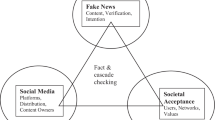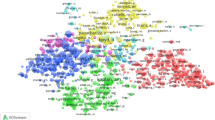Abstract
States are in the process of creating controversial legislation aimed at subjecting ‘harmful’ online communication on social media and search engines to new regulatory regimes. Critics argue that these measures are serious threats to the right to freedom of expression and freedom from surveillance. This article first draws on elements of systems theory to reframe the right to freedom of expression in democracy as a means of protecting the value of generalised second-order observation. Taking the UK’s Online Safety bill as the paradigm example of the new laws, the article analyses the concept of harmful communication at three levels: society, organisation, and subject. It identifies a shift in the law’s epistemic approach to communication, by which individuals are reconfigured from agential subjects into contingent users, whose capacities are determined by the structure of online communication platforms. In this configuration, norms previously considered indispensible are relegated to second-order effects of the affordances of media. Arguing that it is insufficient to merely reaffirm subjective rights in light of this shift, the article suggests systems theoretical analysis as a means of identifying lines of critique.
Similar content being viewed by others
Notes
For instance, the EU included relevant provisions in the Digital Services Act; Germany passed and amended the Network Enforcement Act (Netzwerkdurchsetzungsgesetz) purporting to combat fake news, misinformation, and hate speech; France regulates platforms via the Audiovisual Council; and a number of similar bills aimed at intervening in platform moderation operations are proposed in the US at present.
The dynamic reached new heights in late 2022, when one of the richest men in the world, Elon Musk, bought the unprofitable platform Twitter for a vastly inflated price, in the apparent belief that its former owners had been suppressing freedom of expression on the platform.
‘No provider or user of an interactive computer service shall be treated as the publisher or speaker of any information provided by another information content provider’.
References
Anker, Elizabeth S. 2022. On Paradox: The claims of theory. Durham and London: Duke University Press.
Arendt, Hannah. 1958. The origins of totalitarianism. Cleveland: Meridian Books.
Balkin, Jack M. 2011. Free speech is a triangle. Columbia Law Review 118(7): 2012–2015.
Balkin, Jack M. 2014. Old-School/New-School speech regulation. Harvard Law Review 127(8): 2296–2342.
Balkin, Jack M. 2018. Free Speech in the algorithmic society: Big data, private governance, and new school speech regulation. UC Davis Law Review 51: 1149.
Black, Julia. 1996. Constitutionalising self-regulation. Modern Law Review 59(1): 24–55.
Bratton, Benjamin H. 2015. The stack: On software and sovereignty. Cambridge, Massachusetts: MIT Press.
Bunz, Mercedes. 2019. The calculation of meaning: On the misunderstanding of new artificial intelligence as culture. Culture Theory and Critique 60(3–4): 264–278.
Christodoulidis, Emilios. 2021. The redress of law: Globalisation, constitutionalism, and market capture. Cambridge: Cambridge University Press.
DCMS (Department for Digital, Culture, Media and Sport). 2019. Online harms white paper. CP 57. https://www.gov.uk/government/consultations/online-harms-white-paper. Accessed 30 June 2023.
DCMS (Department for Digital, Culture, Media and Sport). 2023. Overview of expected impact of changes to the online safety bill policy paperhttps://www.gov.uk/government/publications/online-safety-bill-supporting-documents/overview-of-expected-impact-of-changes-to-the-online-safety-bill. Accessed 30 June 2023.
Derrida, Jacques. 1989. Force of law: The ‘mystical foundation of authority’. Trans. Mary quaintance. Cardozo Law Review 11(5–6): 919–1046.
Digital, Culture, Media and Sport Committee. 2018. Disinformation and ‘fake news’: Interim report. HC 363. https://publications.parliament.uk/pa/cm201719/cmselect/cmcumeds/363/363.pdf. Accessed 30 June 2023.
Douek, Evelyn. 2021. Governing online speech: From “Posts-As-Trumps” to proportionality and probability. Columbia Law Review 121(3): 759–834.
Douek, Evelyn. 2022. Content moderation as systems thinking’. Harvard Law Review 136(2): 526–607.
Eisenstein, Elizabeth L. 1982. The printing press as an agent of change. Cambridge: Cambridge University Press.
Esposito, Elena. 2022. Artificial communication: How algorithms produce social intelligence. Cambridge, Massachusetts: MIT Press.
European Commission. 1996. Illegal and harmful communication on the internet. COM (96) 487. https://eur-lex.europa.eu/LexUriServ/LexUriServ.do?uri=COM:1996:0487:FIN:en:PDF. Accessed 30 June 2023.
Ewald, Francois. 1991. Insurance and risk, In The foucault effect: Studies in governmentality. Eds. Graham Burchell, Colin Gordon, Peter Miller. 197–210. Chicago: University of Chicago Press.
Fisk, Nathan W. 2016. Framing internet safety. Cambridge, Massachusetts: MIT Press.
Folkers, Andreas. 2021. Preventing the unpreparable. Catastrophe thresholds from covid to climate. Sociologica 15 (3): 85–106.
Foucault, Michel. 2008. The birth of biopolitics. Ed. A.I. Davidson. Trans. G. Burchell. Basingstoke; New York: Palgrave Macmillan.
Foxglove Legal. 2022b. What is a content moderator?: An FAQ. https://www.foxglove.org.uk/2022/03/29/what-is-a-content-moderator. Accessed 30 June 2023.
Foxglove Legal. 2022a. Daniel motaung launches world-first case to force facebook to finally put content moderators’ health and wellbeing ahead of cash. https://www.foxglove.org.uk/2022/05/10/motaung-facebook-world-first/. Accessed 30 June 2023.
Gillespie, Tarleton. 2018. Custodians of the internet: Platforms, content moderation, and the hidden decisions that shape social media. New Haven: Yale University Press.
Gillespie, Tarleton. 2022. Do not recommend? Reduction as a form of content moderation. Social Media + Society 8(3): 1–13.
Gillespie, Tarleton. 2014. The relevance of algorithms. In Media technologies, ed. Tarleton Gillespie, Pablo J. Boczkowski, Kristen A. Foot, 167–194. Cambridge, Massachusetts: MIT Press.
Grimmelmann, James. 2015. The virtues of moderation. Yale Journal of Law & Technology 17: 42.
Habermas, Jurgen. 1992. The structural transformation of the public sphere: Inquiry into a category of bourgeois society. Trans.T. Burger. Cambridge: Polity Press.
Hacking, Ian. 2006. The emergence of probability: A philosophical study of early ideas about probability, induction and statistical inference. 2nd ed. Cambridge: Cambridge University Press.
Han, Byung-Chul. 2017. Psychopolitics: Neoliberalism and new technologies of power. London; New York: Verso: Trans. E. Butler.
Innis, Harold A. 1972. Empire and communications. 2nd ed. Toronto: University of Toronto Press.
Jain, Shubham, Ana-Maria Cretu, Cully, Antoine and Yves-Alexandre de Montjoye. 2023. Deep perceptual hashing algorithms with hidden dual purpose: When client-side scanning does facial recognition. arXiv preprint arXiv:2306.11924.
Kalulé, Peter. 2019. On the undecidability of legal and technological regulation. Law and Critique 30(2): 137–158.
Kang, Hyo Yoon. 2018. Law’s materiality: Between concrete matters and abstract forms, or how matter becomes material. In Routledge Handbook for Law and Theory, ed. Andreas Philippopoulos-Mihalopoulous. 453–475. London: Routledge.
Keenan, Bernard. 2022. Niklas Luhmann: What is autopoiesis? Critical Legal Thinkinghttps://criticallegalthinking.com/2022/01/10/niklas-luhmann-what-is-autopoiesis/. Accessed 30 June 2023.
Kittler, Friedrich A. 1992. Discourse networks 1800/1900. Stanford: Stanford University Press.
Klonick, Kate. 2018. The new governors: The people, rules, and processes governing online speech. Harvard Law Review 131(6): 1598–1670.
Klonick, Kate. 2020. The Facebook Oversight Board: Creating an independent institution to adjudicate online free expression. Yale Law Journal 129(8): 2232–2605.
Klonick, Kate. 2023. Of systems thinking and straw men. Harvard Law Review 136(6): 339.
Luhmann, Niklas. 1986. The autopoiesis of social systems, In Sociocybernetic paradoxes: Observation, control and evolution of self-steering systems, eds. F. Geyer and J. van der Zouwen. 172–193. London: Sage.
Luhmann, Niklas. 1993. Risk: A sociological theory. Trans. Rhodes Barrett. Berlin, New York: de Gruyter.
Luhmann, Niklas. 1997. Globalization or world society: How to conceive of modern society? International Review of Sociology 7(1): 67–79.
Luhmann, Niklas. 2002. How can the mind participate in communication? In Theories of distinction: Redescribing the descriptions of modernity, ed. William Rasch., 169–186. Stanford University Press.
Luhmann, Niklas. 2012. Theory of society (1). Trans. Rhodes Barrett. Stanford: Stanford University Press.
Luhmann, Niklas. 2012. Introduction to systems theory. Trans. by Peter Gilgen. London: Polity.
Luhmann, Niklas. 2004. Law as a social system. Trans. K. Ziegert. Oxford: Oxford University Press.
McLuhan, Marshall. 2001. Understanding media: The extensions of man. London: Routledge.
Milli, Smitha, Luca. Belli, and Moritz Hardt. 2021. From optimizing engagement to measuring value. Proceedings of the 2021 ACM Conference on Fairness, Accountability, and Transparency. ACM. 714–722. Available at https://doi.org/10.1145/3442188.3445933.
Milli, Smitha, Luca. Belli, and Moritz Hardt. 2022. Causal inference struggles with agency on online platforms. Proceedings of the 2022 ACM Conference on Fairness, Accountability, and Transparency. ACM. 357–365. Available at https://doi.org/10.1145/3531146.3533103.
Moeller, Hans-Georg, and Paul J. D’Ambrosio. 2021. You and your profile: identity after authenticity. New York: Columbia University Press.
Munn, Luke. 2020. Angry by design: Toxic communication and technical architectures. Humanities and Social Sciences Communications 7(53): 1–11.
Murphy, James P. 1980. Evolution of the duty of care: Some thoughts. DePaul Law Review 30(1): 147–179.
Murphy, W. T. 1997. The oldest social science? Configurations of law and modernity. Oxford: Clarendon Press.
Murphy, W. T. 2006. From subject to system: Some unsystematic systems-theoretic thoughts on race equality and human rights. In Luhmann on Law and Politics: critical appraisals and applications, eds. Michael King, and Chris Thornhill., 55–74. Oxford: Hart.
Ofcom. 2021. Letter from chief executive dame melanie dawes to julian knight MP and damian collins MP. 13th September 2021. https://www.ofcom.org.uk/__data/assets/pdf_file/0030/224895/letter-melanie-dawes-draft-online-safety-legislation.pdf. Accessed 30 June 2023.
Opitz, Sven, and Ute Tellmann. 2015. Future emergencies: Temporal politics in law and economy. Theory Culture & Society 32(2): 107–129.
Plunkett, James C. 2015. The historical foundations of the duty of Care. Monash University Law Review 41 (3): 716–744.
Pottage, Alain. 1998. Power as an art of contingency: Luhmann, Deleuze, Foucault. Economy and Society 27 (1): 1–27.
Pottage, Alain. 2012. The materiality of what? Journal of Law and Society 39(1): 167–183.
Rancière, Jacques. 2004. Who is the subject of the rights of man? South Atlantic Quarterly 103(2/3): 297.
Reidenberg, Joel R. 1997. Lex informatica: The formulation of information policy rules through technology. Texas Law Review 76(3): 553–593.
Rosa, Hartmut. 2022. Social media filters and resonances: Democracy and the contemporary public sphere. Theory Culture & Society 39(4): 17–35.
Smith, Graham. 2018. Take care with that social media duty of care. Cyberleagle blog. https://www.cyberleagle.com/2018/10/take-care-with-that-social-media-duty.html. Accessed 30 June 2023.
Smith, Graham. 2023. ‘Shifting paradigms in platform regulation’. Cyberleagle bloghttps://www.cyberleagle.com/2023/06/shifting-paradigms-in-platform.html. Accessed 30 June 2023.
Sullivan, Gavin. 2022. Law, technology, and data-driven security: Infra-legalities as method assemblage. Journal of Law and Society 49 (S1): S31–S50.
The Coroner’s Service. 2022. Molly russel – regulation 28 report to prevent future deaths. https://www.judiciary.uk/wp-content/uploads/2022/10/Molly-Russell-Prevention-of-future-deaths-report-2022-0315_Published.pdf. Accessed 30 June 2023.
Vismann, Cornelia. 1999. Jurisprudence: A transfer science. Law and Critique 10(3): 279–286.
Vismann, Cornelia, and Markus Krajewski. 2008. Computer juridisms. Grey Room 29: 90–109.
Weatherby, Leif, and Brian Justie. 2022. Indexical AI. Critical Inquiry 48 (8): 381–415.
Woodhouse, John. 2022. Analysis of the online safety bill. House of commons library No 9506. https://researchbriefings.files.parliament.uk/documents/CBP-9506/CBP-9506.pdf. Accessed 30 June 2023.
Woods, Lorna, and William Perrin. 2019. Online harm reduction – a statutory duty of care and regulator. Carnegie UK Trust. Available at: https://doi.org/10.2139/ssrn.4003986. Accessed 30 June 2023.
Zuboff, Shosana. 2019. The age of surveillance capitalism: The fight for a human future at the new frontier of power. London: Profile Books.
Acknowledgements
I am grateful to Bo Bottomley, Stewart Motha, and Alexandra Sinclair for reading and commenting generously on draft versions of this article, and to my colleague Nathan Moore and the students in our Critical Approaches to Technology seminar for the discussions and debates that informed it.
Author information
Authors and Affiliations
Corresponding author
Additional information
Publisher’s Note
Springer Nature remains neutral with regard to jurisdictional claims in published maps and institutional affiliations.
Rights and permissions
Springer Nature or its licensor (e.g. a society or other partner) holds exclusive rights to this article under a publishing agreement with the author(s) or other rightsholder(s); author self-archiving of the accepted manuscript version of this article is solely governed by the terms of such publishing agreement and applicable law.
About this article
Cite this article
Keenan, B. Regulating Communicative Risk: Online Harms and Subjective Rights. Law Critique (2023). https://doi.org/10.1007/s10978-023-09353-6
Accepted:
Published:
DOI: https://doi.org/10.1007/s10978-023-09353-6




